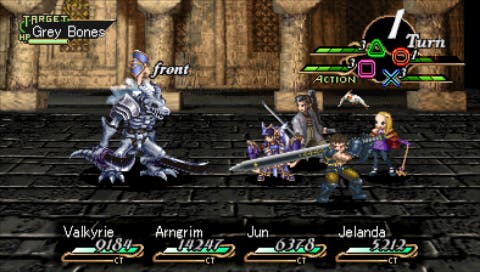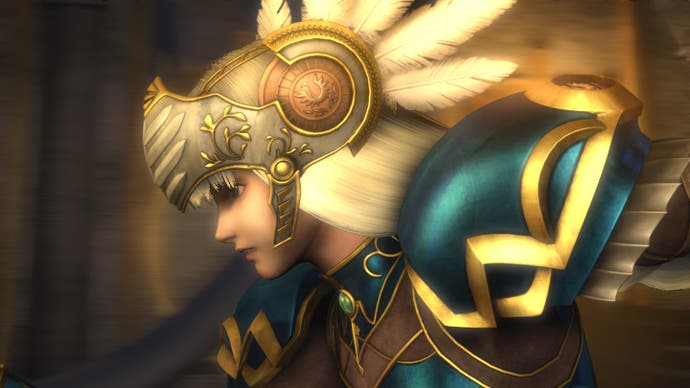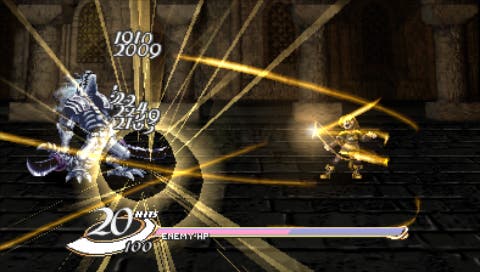Valkyrie Profile: Lenneth
Portrait of a killer.
So, this is the PSP RPG you've been waiting for.
It's intelligent in design, rich in storytelling, expertly paced in action, deep and meaningful in dialogue, beautifully scored and stunningly hand-drawn and animated. It boasts near imperceptible loading, and urgently presses into your palms a battle mechanic that's at once quickly accessible in the short term and genuinely compulsive in the long.
And yet, in so many other ways, it's not the PSP RPG you've been waiting for at all.
It's wholly quirky and counter-cultural, relentlessly melancholic, at times ugly and awkward in design and it's uncomfortably drenched in an ambiance of tragic darkness that Hollywood-shlock Resident Evils or gory Quakes would have neither the subtlety nor the inclination to pull off.
Expectedly, this isn't a PSP original but rather port of the rare and highly regarded Enix PSone game, Valkyrie Profile - a title that never saw a European release and only enjoyed a very limited American print run in 2000. It has since earned cult following for good reason, matching deep and complex gameplay with heavy narrative themes of life, death, tragedy, meaning, glory and heroism all viewed through the lens of Norse gods.

As such, the game's backdrop and narrative concern is about as far from the spiky-haired orphan waiting to prove himself or disgraced knight on a journey to restore family honour as is imaginable. You play (principally) as Lenneth, a Valkyrie goddess of war and right-hand maiden to the Odin, leader of the heavenly Aesirs.
Lenneth's special ability is: "to hear the sorrow, anger and hopes of humans near death". In the uncultured and immature world of videogames we're well used to such portentous abilities being gutturally announced against flashed up imagery of thick blood and orchestral stabs of terror. But snuff voyeurism is far from the heart of this more tender game.
Rather, Lenneth's job is to draw near to humans approaching death, often with compassion and concern, in order to watch their final few days of life. She must then judge whether they are suitable in character, maturity and intention to join the gods as ethereal heroes to fight in the impending battle of Ragnarok, when the Aesir and their archenemies Vanir will fight to decide the fate of the gods.
So essentially this is a divine recruitment consultancy simulation, the player profiling and sifting through the human resources available in the world (Midgard) story by story, harvesting the souls of those fallen few that make the heroic cut to build an army.
Whereas staple RPGs would have you on a quest to defy the universal full stop of impending Ragnarok, Valkyrie Profile has the player embracing this Norse Armageddon as a helpful deadline to work towards. A timer counts down through the game - 192 days until apocalypse now - and each story, town visit and rest break 'costs' a set number of days to play. So you have a limited time to explore the game's various story vignettes before your overarching quest is tied up in Armageddon, its victory partially decided upon by the team of newly deceased you have nurtured and sent to fight there. Spend your time unwisely and you won't be strong enough for the final encounter.
If this all sounds a little pressured, Valkyrie Profile quickly settles into an enjoyable rhythm that focuses the journey through what is undeniably a dense and complicated forest of unique gameplay.

Before each story Lenneth hovers above the khaki, washed out 3D plains of Midgard and, by pressing the start button, can focus to hear if there are any humans - be it prince or pauper - near death in the proximity. If so, you'll catch snippets of spoken and leading conversation to entice you into their world of relationships and problems. Next you fly down to them, slowly witness their story via cut-scenes and exploration, possibly work through a mini-Castlevania-style dungeon, up until the character's inevitable death. Then that character can be brought into your team to play on through the next story.
Once in your ethereal squad it's not just a simple case of levelling each character up. Human attributes such as selfishness, kindness, cuteness and bravery must be upgraded and downgraded with accrued points to make them better, more heroic people. You then have a choice- either send the character off to Odin to fight in the final battle - or keep the fighter with you to work through the next story on earth. The player constantly has to make key management choices and, while occasionally bewildering, this ensures that each player's experience of the game is near unique - as evidenced by the multiple endings available.
The dungeons themselves are unique for an RPG. Viewed like a sideways platform game each is relatively short and full of simple key and fetch mechanisms, punctuated by treasure chests and enemies. Lenneth (the only character visible in the field) must nimbly jump to and from platforms to solve each dungeon. An ice crystal shot move allows her to build temporary platforms to reach new areas. The platforming is simplistic and offers little precision - the controls often feeling slightly laggy and inexact. Enemies are visible in the dungeon and, once attacked and defeated never respawn - a pleasing choice that greatly compensates for any difficulty in actually getting around.
As well as Lenneth you can take up to four characters into battle - all would-be heroes you have rescued and chosen from your travels - and each one's primary attack is assigned to one of the four face buttons on the PSP. Offensive moves are triggered by pressing the corresponding button - there are no menus to negotiate and as a result, all strategy is focused on the timing of your button presses. By successfully completing combos a special attack gauge at the bottom of the screen fills which, if you manage to max it out, allows a far more powerful move to be executed. There's much hidden depth to the quick-fire system - varying bonuses being meted out for whether you hit an enemy in the air or on the ground during a combo and, thanks to the immediacy of the menu-less interface and vastly customisable and augmentable offensive options, it's a long time before battles get tiresome.

Indeed, the game is so full of gameplay nuances that the deeper, more complex layers of the experience are never really explained well either in-game or in the instruction manual. This is manageable for experienced RPG players who can feel their way about or trade information with peers; for anybody trying out the genre alone it can often be confusing.
Likewise, the stifling, over-dramatic language and relentlessly sombre mood can grate after a while. Watching tragic death after tragic death coupled with the lack of any comic relief and the game's inescapable tendency to be overly verbose is arduous. You can tell a lot about a game from the song titles of its soundtrack. "Eternal Engine of Linguistic Massacre" and "Epic Poem to a Sacred Death" are full of the game's bombastic pompousness and contrast the more redemptive thoughtfulness of track titles "When a Person Changes" and "Turning Over a New Leaf". Such juxtaposition typifies the line between strutting silliness and compact profundity that the game constantly hops over.
But, in the main, Valkyrie Profile creates a stark but beautifully lined atmosphere. The orchestral midi score sweeps the player into its world each time the PSP is turned on and the character design is, in places, undeniably iconic - Lenneth's winged helmet and perfect proportions in particular the stuff of character design pixel beauty.
This is far from a Final Fantasy-style RPG game and buyers expecting similarities, based on the score below, will be sorely disappointed and lost. But, if we absolutely must have videogame genre distinctions, then let's accept that their boundaries are wide and deep enough to embrace more than one excellent but wholly distinct expression of the form. Valkyrie Profile Lenneth is exactly that - wholly distinct from the rest of the crowd, a niche within a niche, marvellously thought out and mostly brilliantly executed. If there were other comparably innovative and inventive Japanese RPGs to set this against, then its flaws might cause it to be judged more severely. But it stands alone, a rare original expression of Japanese role-playing individuality, and as such, this thick and dense forest of an experience is worth every cut you suffer along the way.
Although no European launch has been officially announced it's highly likely it will hit Europe early next year to tie in with the forthcoming PS2 sequel.








